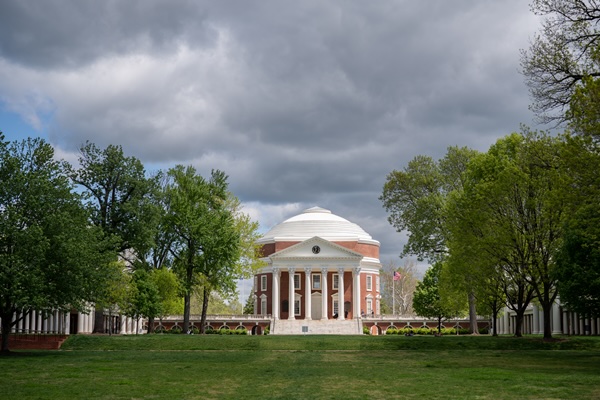Good and Safe – Youth Protection in the Region and Beyond!
Charles Johnson is the Manager of the Office of Youth Protection at the University of Virginia. He leads education on keeping youth safe, updates the University of Virginia’s policies and procedures with industry standards for ever-emerging types of youth engagement, creates additional resources for program staff, and serves on the board of directors for the Higher Education Protection Network. Most of his 20+ year career has been dedicated to serving youth in various ways. Johnson has served juvenile justice, healthy and active living, experiential learning/STEM programs, and supported youth-serving non-profits with professional development.
The Story of Youth Protection
Did you know the University of Virginia serves more kids on Grounds throughout the year than enrolled students? In fact, it’s a lot more. While UVA had an undergraduate enrollment of around 17,500 last fall, it served over 21,000 minors through youth programming and camps in 2023. These programs vary greatly and can include anything from an engineering program centered on growing the next generation of STEM professionals to an athletics camp led by nationally recognized coaches, staff, and even UVA athletes. Through these enrichment activities, the University positively impacts the surrounding community and, ultimately, helps to further what was laid out in the University of Virginia’s 2030 Plan: to be both great and good.
With over 250 programs and thousands of youth visiting our facilities each year, safety is a top priority for the University. In 2019, the UVA Office of Youth Protection was established to provide a centralized location to manage and resource programs with all the federal, state, and University guidance required for youth programming. For instance, the Office of Youth Protection oversees the requirements for those approved to interact with these young people, including background checks, training, and adherence to a Code of Conduct. Another aspect of our work is to train staff about child abuse, including when and how to know and report the signs of abuse to authorities.

Youth Protection by Way of Awareness
Since 1983, April has been recognized as National Child Abuse Prevention Month (NCAPM). Throughout the month, people across the nation highlight the prevention work happening at the state and local levels and educate our communities on how to collaborate to prevent child abuse and neglect. The data shows that child abuse remains a consistent issue; according to the Centers for Disease Control and Prevention (CDC) and Darkness to Light, in the United States, at least 1 in 7 children have experienced child abuse or neglect in the past year, and 1 in 10 children will be the victim of sexual abuse before they turn 18. In Virginia alone in 2023, there were almost 3,000 Child Protective Services investigations involving over 4,300 children, and the state was involved in 26 reports of suspected human trafficking involving minors.
The UVA Office of Youth Protection and the entire UVA Department of Safety and Security are responsible for promoting a safe and supportive learning environment for every person on Grounds, including our youth. Throughout the year, we train over 1,800 staff and University-affiliated individuals to recognize and report child abuse. We also meet with program directors to discuss individual circumstances and provide information on how to respond to these situations. Over the years, we have reported suspected abuse or neglect to the Virginia Department of Social Services and worked with our partners across the University to provide support and resources to survivors. In addition to our work on Grounds, we work with a group of youth protection stakeholders from throughout the Atlantic Coast Conference and serve on the Board of Directors for the Higher Education Protection Network (HEPNet), an international association working to advance the interactions between higher education institutions, and children and youth.

Recognizing and Reducing the Risk of Child Abuse
So, how can you recognize National Child Abuse Prevention Month? While each state has its own requirements, reporting begins with building awareness of the issues. We encourage you to become informed on how to recognize and report suspected child abuse and neglect. Our website has a resource library with a Parent and Family Resource Section, including links for how to talk with your children about abuse, what questions you can ask of camps/youth programs, and a link to the CyberTipline, where online exploitation can be reported. A detailed resource for Making the Call to report suspected child abuse or neglect is also available; the steps for reporting are as follows:
Reporting Suspected Child Abuse or Neglect
- If a child is in immediate danger, call 911.
- Dial 1-800-552-7096 (Virginia Child Abuse and Neglect Hotline).
- At the end of the call, they may give you a case number. Write it down so you can include it in the report for the University.
- Report to the University and College at Wise.
UVA: Notify the Office of Youth Protection through JustReportIt or youthprotection@virginia.edu.
College at Wise: Notify Tabitha Smith, Associate Vice Chancellor for Diversity, Equity, and Inclusion; Report in-person, via phone at 276-870-5065, or email at dei@uvawise.edu.
Reporting Peer-on-Peer Sexual Abuse
Peer-on-peer sexual abuse may require a report to law enforcement rather than to the Department of Social Services, Child Protective Services Hotline. If you are unsure, begin by calling the hotline at 1-800-552-7096, and they can provide further instructions or directions.
====
Footnote: Are you interested in hosting a youth program or event on Grounds? Do you have more questions about our work to support children during their time with us? We encourage you to reach out via email at youthprotection@virginia.edu.
- Having a Drink With Your Donkey: The Absurd in Antiquity
- What Happens to UVA’s Recycling? A Behind the Scenes Look at Recycling, Composting, and Reuse on Grounds
- Finding Your Center: Using Values Clarification to Navigate Stress
- UVA Club of Atlanta: Virtual Pilates Class
- UVA Club of Fairfield/Westchester: Cavs Care - Food Pantry Donation Drive
- UVA Club of the Palm Beaches: Hoo-liday Cruise